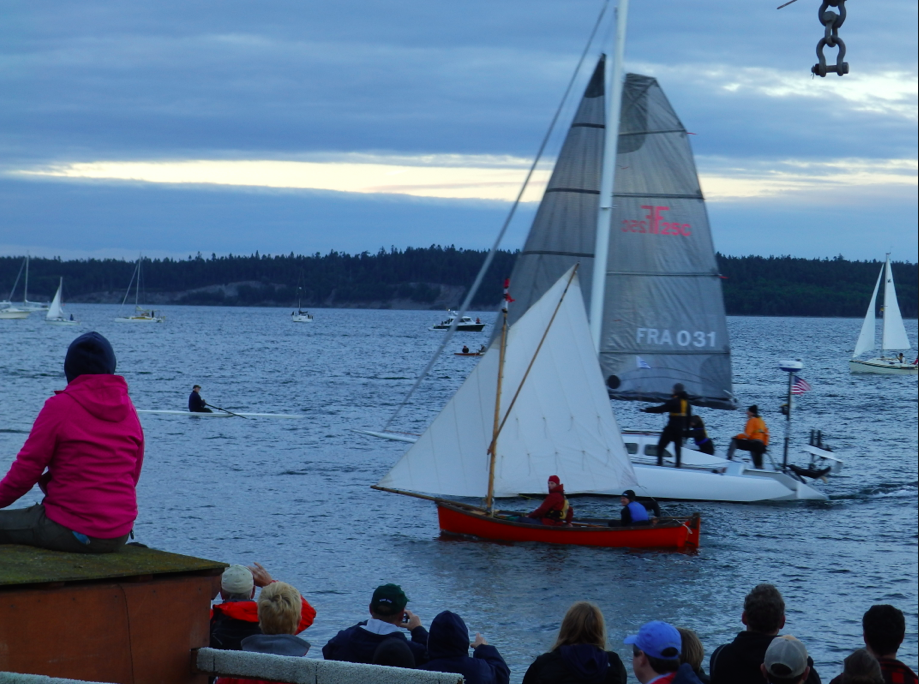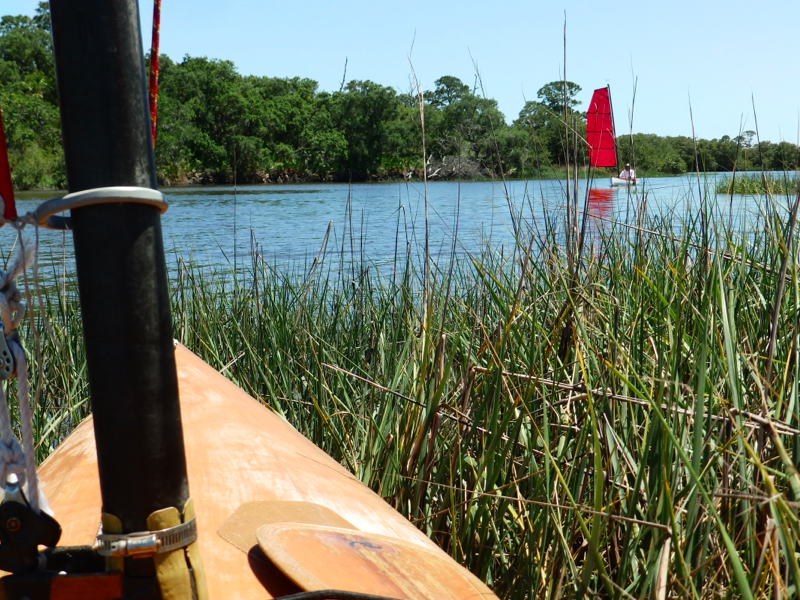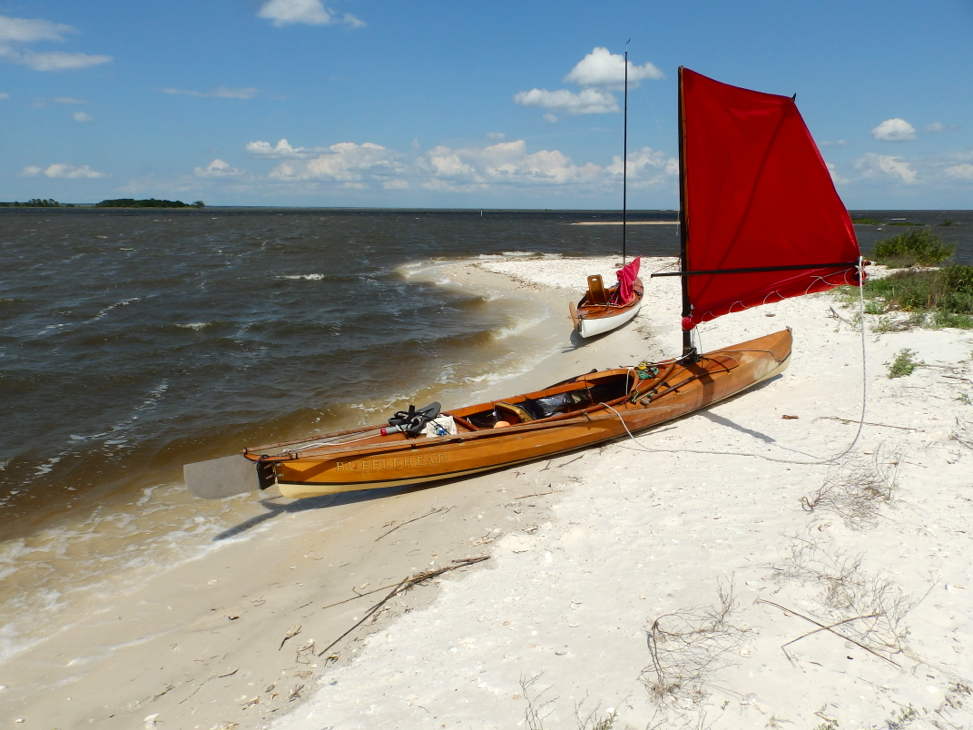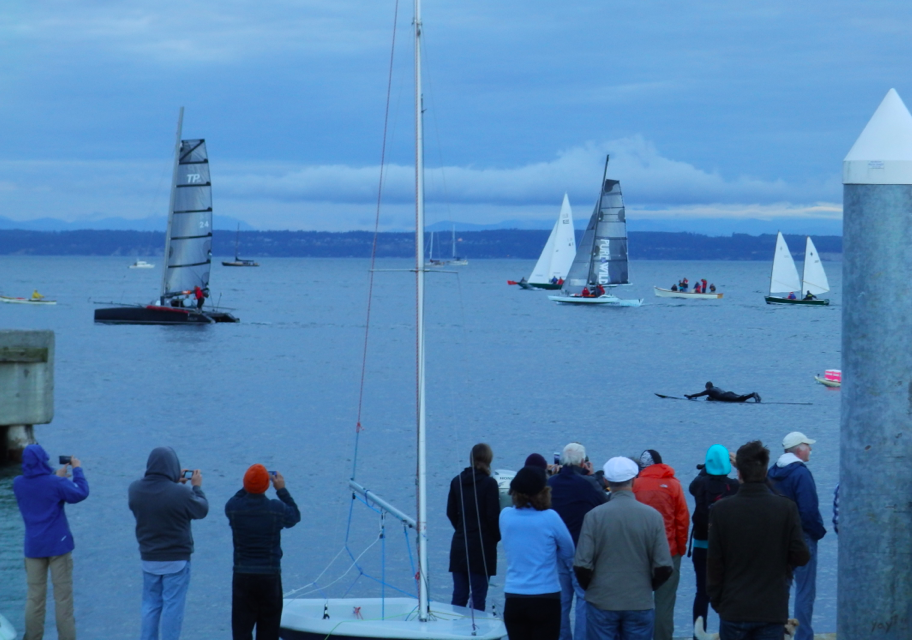Cedar Key and the Pacific Northwest, 2015
~~~On the cold coast, Ivan Doig's The Sea Runners, and Roger Mann
Previously published in Small Craft Advisor, September / October 2015, Issue No. 95
Granddaughter Hannah, in Seattle, invited me to her high school graduation. "You should go!" Karen said. She was right - I'd missed my children's every graduation. We'd meet in Seattle and see her son in Portland, too. Then, I realized, the Race to Alaska's start was a couple days before Hannah's party.
 A novel, The Sea Runners by Ivan Doig, is, to us, inseparable from the Race, the R2AK. Doig's Swedes in 1853
flee Russian control of Sitka, paddling in winter for the Columbia River, a thousand miles in a twenty foot by three foot,
"sprightly built," Tlingit dugout. The R2AK (wind or human power only) is seven hundred fifty miles from Port Townsend
Washington to Ketchikan Alaska. I've seen most of the course from Alaska ferries..
A novel, The Sea Runners by Ivan Doig, is, to us, inseparable from the Race, the R2AK. Doig's Swedes in 1853
flee Russian control of Sitka, paddling in winter for the Columbia River, a thousand miles in a twenty foot by three foot,
"sprightly built," Tlingit dugout. The R2AK (wind or human power only) is seven hundred fifty miles from Port Townsend
Washington to Ketchikan Alaska. I've seen most of the course from Alaska ferries..
Meanwhile, early May in Cedar Key, quoting a surfer in the 1966 movie Endless Summer, "You reeeally missed it!" Because of an early season tropical low on Florida's east coast, air was a little cooler and drier. And with high tides in the afternoon, the conditions were the best I've known in the meet's thirty years.
Friday, May first at noon was sunny. The northwesterly ten to fifteen knots gusted over eighteen; water temperature was upper 70s, and air, too. Feathering Bufflehead's single reef, I was still wet bouncing across the flood's bands of currents to Atsena Otie Key.
In the afternoon, full reefed, I returned across the strong ebb. I kept to leeward so the current could bring me up to close reach in, rather than first climbing to windward, then broad reaching slowly over the ground, rolling in Bufflehead in wind-against-tide waves feeling shallows.
Saturday, moderate southwesterlies. Maybe a hundred greatly varied boats, full of smiles, came and went all day off Atsena's north beach.
 The seven or eight knot breeze was fair and delightful, but the ebb was against Bill Ling, Goke Tomlinson and me in
our sailing canoes. For a hundred twisted yards into Atsena we scraped leeboards, clanked rudder blades, and felt and
heard the lurch and screech of our hulls. Ling and I parked in a clump of black needle rush; Goke turned south into the
main Channel-thru. The current and thriving oysters stopped him forty yards in.
The seven or eight knot breeze was fair and delightful, but the ebb was against Bill Ling, Goke Tomlinson and me in
our sailing canoes. For a hundred twisted yards into Atsena we scraped leeboards, clanked rudder blades, and felt and
heard the lurch and screech of our hulls. Ling and I parked in a clump of black needle rush; Goke turned south into the
main Channel-thru. The current and thriving oysters stopped him forty yards in.
Sunday, returning from Snake Key, the easterlies failed and the ebb was foul. I paddled half way back with the double blade, but, against the stiff ebb over the sand east of Atsena, I mostly poled with the four foot deck paddle.
 Monday, southeast ten to twelve. Goke and I in our Buffleheads tacked with the flood east to Corrigan Reef. By 2:30 PM
and high tide, the wind had backed to east northeast and grown to gusts over twenty five. Returning with the ebb, Goke
used his twelve square foot full reef, while I barepoled, content with a few strokes of the single blade.
Monday, southeast ten to twelve. Goke and I in our Buffleheads tacked with the flood east to Corrigan Reef. By 2:30 PM
and high tide, the wind had backed to east northeast and grown to gusts over twenty five. Returning with the ebb, Goke
used his twelve square foot full reef, while I barepoled, content with a few strokes of the single blade.
Tuesday, east twelve to eighteen, Goke and I wetly ran and broad reached southwest a mile against the flood. We gybed north at Piney Point, and reached up the flat water in the lee, stopping at "Aero Beach," Rattlesnake Key, McClamory Key and the Shell Mound takeout at three pm, the top of the tide, seven miles from Cedar Key. At each stop, Clapper Rails applauded.
 The Pacific Northwest, Port Townsend Washington. June 4th pre-dawn at 4:50 AM, Karen and I wore wool and fleece. A
fifteen knot westerly from the Strait of Juan de Fuca flew down the hills to the waterfront, across the cold depths off
Town, and out to Admiralty Inlet. The Olympic range's snow turned pink below the two-days-past-full moon.
The Pacific Northwest, Port Townsend Washington. June 4th pre-dawn at 4:50 AM, Karen and I wore wool and fleece. A
fifteen knot westerly from the Strait of Juan de Fuca flew down the hills to the waterfront, across the cold depths off
Town, and out to Admiralty Inlet. The Olympic range's snow turned pink below the two-days-past-full moon.
At 5:30 am, the crowd cheered when the boats bore north for the Strait, as kick-ass orchestral music boomed through the PA system. "The Russian anthem," I overheard.
In Seattle, June 6th, the fine weather wafted onto Hannah's gathering, for which the R2AK music could've been a rousing graduation march.
At Astoria Oregon we saw the cement replica of a twenty foot burial canoe on a hill six hundred feet above the Columbia
River. Its high bow aims northwest at the River's stern mouth, and to Willapa Bay, Washington, where the Sea Runners came
off the foggy Pacific.
Congratulations to all the R2AK contestants, and particularly to Roger Mann, the Everglades Challenge veteran, the first solo boat to finish. "Every day of the race I was cold to the bone - so cold my eyeballs hurt."
Back in Cedar Key, with water temperatures in the mid 80s plus, I'm still earwormed by that music, maybe notated first in 1912. I want to believe it was heard in Sweden in the 1800s.
~ HH